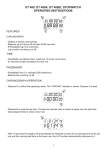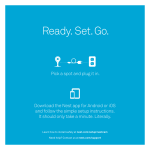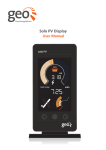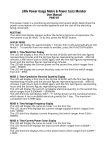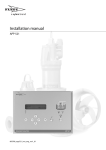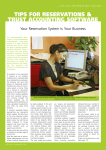Download PDF - Reeds Rains
Transcript
Helpful Tips for Tenants What to do in an emergency Leaking, burst or frozen pipes Turning off electricity Controlling your central heating Bleeding a radiator Troubleshooting Emergencies Out of Hours Emergency Maintenance Lettings Centre tel: 0161 491 8503 Lettings Centre opening hours: Monday to Friday 9.00am - 5.30pm Saturday 9.00am - 1.00pm Sunday Closed Bank Holidays Closed Leaking, Burst or Frozen Pipes When pipes leak: • Place a dish or bowl underneath the leak. • Pull back any carpets and lay down newspapers or towels to absorb any dampness. When pipes burst: • Turn off the water at the main stopcock, and switch off any water heaters. • Open all taps to drain water from the system. • Can it be isolated? Some appliances may have their own isolation valve, you can use these to stop their water supply. If electric fittings get wet: • Do not touch. • Turn off electricity at the consumer unit. See “Turning off electricity” Turning Off Electricty If you need to turn off all electricity (e.g. because of water penetration), use the main ON/OFF switch on the electricity consumer unit (fuse box). Checking your fuse box: Check your consumer unit (fuse box), It will either have fuses or trip switches. Modern electric circuits are fitted with a circuit breaker fuse system. If a fault develops, a switch is tripped and the circuit is broken, stopping power to the circuit. Older units will have fuses. When a switch is tripped: Open the cover on the consumer unit to expose the trip switches. Check which switches have tripped to the OFF position and put them back to the ON position. For more detail, refer to any user manual supplied. Plugs: Overloaded circuits are common causes of a trip or blown fuse. Therefore do not overload plug sockets by using multiple plug adaptors. Controlling Your Central Heating During freezing spells, keep the heating on all the time to prevent the pipes from freezing. If you are out you can turn the thermostat down. How to control the temperature: • The thermostat maintains the temperature in your property. To set it, turn the dial so that the arrow or marker is against the temperature setting you want. • You should also note that on many systems, the individual radiators can be controlled via the turn knobs on the side valves. Thermostatic radiator valve Thermostat Controlling Your Central Heating How to set a digital timer: Check the clock is showing the correct time. If not, put the timer switch to ‘clock’ and adjust the time using the ‘forward’ and ‘reverse’ buttons. Reset the timer switch to ‘auto’. Set the ‘heating’ and ‘hot water’ switches to come on once, twice or stay on all the time, as you require. How to set a clock timer: Turn the clock until it is showing the correct time. Decide when you want the heating to come on and go off and set the pins or arrows for those times (see below for how to change the pins and arrows). Set the timer switch to ‘timer’ or ‘auto’ as appropriate to the unit. During freezing spells, keep the heating on all the time, and turn the thermostat down during the night and if you are out all day. Changing arrows on time clock: Slide the ‘on’ arrows (usually red) around the clock to the times when you want the heating to come on. Slide the ‘off’ arrows (usually blue) around to the times when you want the heating to go off. Turn the clock until it is showing the correct time. Decide when you want the heating to come on and go off and set the pins or arrows for those times. Set the timer switch to ‘timer’ or ‘auto’ as appropriate to the unit. Bleeding A Radiator When to do it: If the top part of the radiator is cold, while the bottom is warm, this is because air is trapped in the system (which should be filled with water). Bleeding the radiator releases this air and allows hot water to fill the whole system. Before bleeding: If the whole radiator is cold, check that the radiator valve is turned up. If more than one radiator is cold, the whole system may need to be checked by a heating engineer. Call your property manager during working hours. Turn off the heating system before bleeding; otherwise the pump might draw more air into the system. You will need a special radiator key, available from most DIY and hardware shops. You will also need a rag or cloth and a bucket or bowl. How to bleed: The bleed valve is the smallest square nut at the top end of the radiator. Place the key over the valve and hold the cloth around it to catch any water. Gently turn the key anti-clockwise until you hear a hiss – this is the air being released. When water starts to come through, turn the key back clockwise to shut the valve off. DO NOT unscrew the valve completely as the plug will come out. Troubleshooting My electric oven has stopped working: • You may have accidentally re-set the timer. Check and reset your clock. • If there is no power at all, check your fuse box to ensure that the circuit hasn’t been broken. My washing machine is not draining, or has stopped mid cycle: • Your pump filer is probably blocked. Drain the machine and check the filter for foreign objects. My sink is draining slowly / not draining at all: • This is likely to be caused by a build up of food and lime scale. • Buy a sink/drain unblocking liquid to remove the blockage. My radiators aren’t hot all the way up: • There is too much air in the system. • You need to bleed your radiators. My central heating isn’t working properly: • Have you checked that the thermostat isn’t set too low and that the timer is set correctly on the boiler? Emergencies The following are suggestions of what to do in case of an emergency situation. Fire In case of fire dial 999. Get everyone out and do not go back for any reason. Close all doors and windows. Warn your neighbours if any of them might be in danger. If you live in a block of flats set off the communal fire alarm. Smell off Gas Open the doors and windows. Check to see if any gas has been left on unlit, or the pilot light has gone out. If so, turn the appliance off, and do not try to relight it. If you are uncertain whether the leak has been stopped, turn the main gas supply off at the meter and phone the gas emergency service immediately: National Grid 0800 111 999 • Do not turn any electrical switches on or off • Do not use the door bell • Do not smoke • Do not use matches or naked flames Emergencies The following are suggestions of what to do in case of an emergency situation. Bursting or Leaking Pipe Turn the water off at the mains. If electrics are effected, turn off the electricity at the consumer unit (see helpful tips). Call your property manager. Loss of Electricity If neighbours are also effected, call your electricity company (check your electricity bill for the number). Check your fuse box to see if a switch has tripped or a fuse blown (see helpful tips). If none of the above apply and the problem persists, call your property manager.










